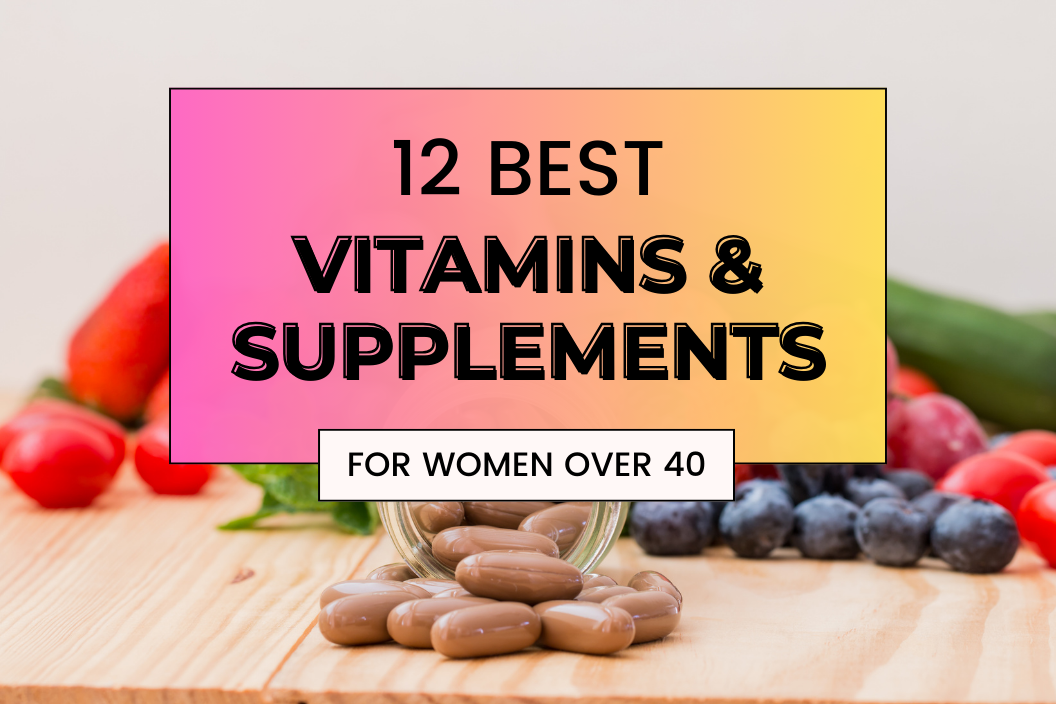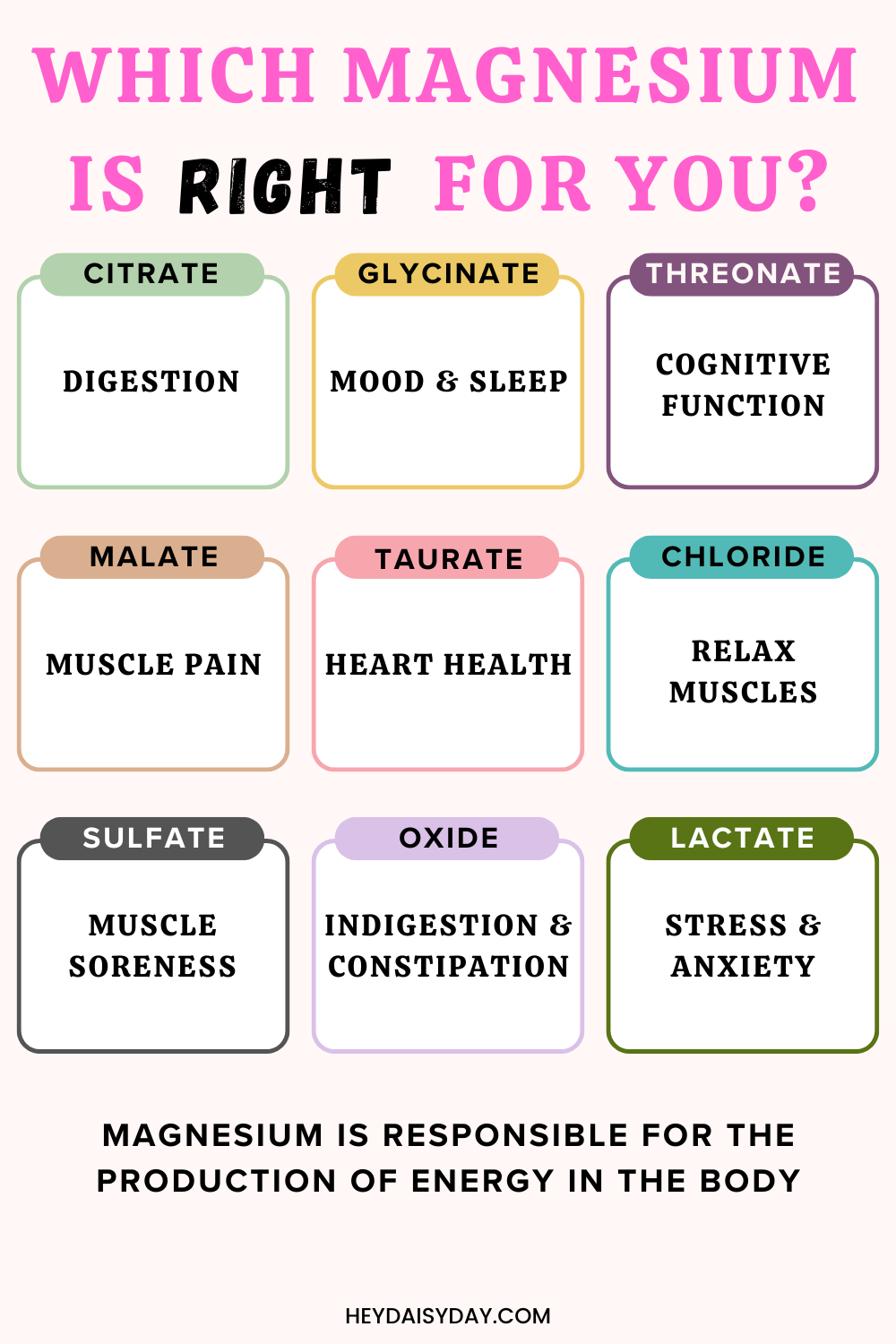
In my 20s and early 30s, I never imagined I’d face issues with sleep! To make matters worse, I once threw my back out and was stuck in bed for a few days. That’s when I realized I might need some help from my diet and, more specifically, from vitamins and supplements.
As we age, our bodies go through various changes, and women over 40 often experience symptoms like fatigue, mood swings, decreased bone density, and muscle mass loss. Luckily, the right vitamins and supplements can help tackle these issues and boost overall health and vitality.
In this article, we’ll explore the 12 best vitamins and supplements for women over 40, detailing their benefits, the best time to take them, and how they can address common symptoms. We’ll also sprinkle in some essential keywords and considerations to ensure a well-rounded approach to your health.
1. Magnesium: The Stress Reliever and Sleep Supporter

I’m not alone in struggling with sleep! Many women over 40 face similar issues, but magnesium can be a game-changer. There are various types of magnesium, each offering different benefits. For improving sleep specifically, magnesium glycinate is particularly effective.
Common Symptoms:
- Stress and Anxiety: Magnesium plays a crucial role in regulating the nervous system, and a deficiency can lead to heightened stress and anxiety.
- Poor Sleep Quality: Magnesium deficiency is often linked to insomnia and restless sleep.
- Muscle Cramps and Weakness: Magnesium is essential for muscle contractions and relaxation, and a deficiency can result in cramps and muscle weakness.
Solution and Benefits:
Magnesium is a mineral supplement that offers numerous benefits, especially for women over 40. It helps reduce stress, improve sleep quality, and support muscle function. Additionally, magnesium plays an important role in heart health by maintaining healthy blood pressure levels and supporting cardiovascular function.
Best Time to Take Magnesium:
- Evening: Taking magnesium before bed can help improve sleep quality and reduce nighttime muscle cramps.
- Post-Workout: For those engaging in physical activity, taking magnesium after a workout can aid in muscle recovery and reduce cramps.

What we recommend: [Click here to get the supplement]
2. Vitamin D with K2: The Bone Health Duo

It seems like everyone is taking vitamin D these days, but did you know that pairing it with vitamin K2 is actually really important? Vitamin K2 helps ensure that the calcium from vitamin D is directed to your bones and not to your arteries. So, to get the most out of your vitamin D supplement and support your bone health effectively, make sure you’re taking it alongside vitamin K2.
Common Symptoms:
- Bone Pain and Weakness: As we age, our bodies produce less vitamin D, leading to a deficiency that can weaken bones.
- Mood Swings and Depression: Low vitamin D levels are linked to mood disorders, including depression.
- Immune System Weakness: Vitamin D deficiency can compromise the immune system, increasing susceptibility to infections.
Solution and Benefits:
Vitamin D is a fat-soluble vitamin essential for calcium absorption, making it vital for bone health. When combined with vitamin K2, it ensures that calcium is directed to the bones rather than arteries, preventing calcification and promoting cardiovascular health. This combination is particularly important for postmenopausal women who are at a higher risk of osteoporosis.
Best Time to Take Vitamin D with K2:
- Morning with Breakfast: Vitamin D is best absorbed with a meal containing healthy fats, making breakfast an ideal time.
- Winter Months: During the winter, when sunlight exposure is limited, it’s crucial to supplement with vitamin D to prevent deficiency.
What we recommend: [Click here to get the supplement]
3. Collagen: The Beauty and Joint Protector

When you're in your 20s, it’s easy to take your nails, hair, and skin for granted. But as we age, we start to pay more attention to our natural beauty rather than just relying on makeup. I've found that incorporating collagen into my morning coffee has made a noticeable difference in my skin and hair. Collagen types I and III are essential for promoting skin health and elasticity, helping to improve texture and reduce signs of aging. It's amazing how this simple addition to my routine has made such a positive impact on my overall appearance!
Common Symptoms:
- Wrinkles and Sagging Skin: Collagen production decreases with age, leading to visible signs of aging like wrinkles and sagging skin.
- Joint Pain and Stiffness: Reduced collagen levels can lead to joint discomfort and decreased mobility.
Solution and Benefits:
Collagen is a protein supplement that supports skin elasticity, reduces wrinkles, and promotes joint health. Types I and III collagen are particularly beneficial for improving skin texture, reducing signs of aging, and supporting connective tissues, including joints, tendons, and ligaments. Collagen also plays a role in muscle mass maintenance, making it an essential nutrient for older women.
Best Time to Take Collagen:
- Morning: Adding collagen to your morning coffee or smoothie can kickstart your day with a boost for your skin and joints.
- Post-Workout: Taking collagen after a workout can aid in muscle recovery and joint support.
What we recommend: [Click here to get the supplement]
4. Omega-3 Fatty Acids: The Heart and Brain Protector

Once I discovered the benefits of fish oil for reducing inflammation, I started taking it religiously. It’s been great for supporting heart health, improving dry eyes, and enhancing muscle recovery.
If you’re following a vegan diet, don’t worry—we’ve got you covered with plant-based omega-3 options!
Common Symptoms:
- Heart Palpitations and High Blood Pressure: As women age, the risk of heart disease increases, and maintaining heart health becomes crucial.
- Brain Fog and Memory Issues: Cognitive decline is a common concern for older adults, and omega-3s support brain function and memory.
Solution and Benefits:
Omega-3 fatty acids, found in fish oil, are essential for heart health and brain health. They reduce inflammation, lower triglyceride levels, and support healthy blood pressure. Omega-3s also protect against cognitive decline, making them a critical supplement for maintaining mental clarity and focus.
Best Time to Take Omega-3 Fatty Acids:
- With Meals: Omega-3s are best absorbed with food, particularly meals that contain dietary fats.
- Morning: Taking omega-3s in the morning can help support cardiovascular health throughout the day.
What we recommend:
OMEGA - 3: [Click here to get the supplement]
VEGAN: [Click here to get the supplement]
5. B Complex (Including B12): The Energy and Mood Booster

Ever find yourself dragging through the day or feeling a bit off emotionally? Trust me, you’re not alone. Many of us have days where we just need a little extra pep and a boost in mood. That’s where B Complex vitamins come in. Think of them as your all-in-one energy and mood-boosting power team.
Common Symptoms:
- Fatigue and Low Energy: B vitamins are essential for energy production, and a deficiency can lead to chronic fatigue.
- Mood Swings and Depression: B12 and other B vitamins play a crucial role in brain function, and a deficiency can contribute to mood disorders.
- Anemia: B12 deficiency can lead to anemia, characterized by fatigue and weakness.
Solution and Benefits:
B complex vitamins, including B12, are water-soluble vitamins that support energy production, brain function, and mood regulation. They are particularly important for maintaining red blood cells and preventing anemia. B vitamins also support the nervous system and promote mental clarity, making them essential for older women.
Best Time to Take B Complex:
- Morning with Breakfast: B vitamins are best taken in the morning with food to kickstart your energy levels for the day.
- When Feeling Sluggish: If you experience an afternoon slump, taking a B complex can provide a quick energy boost.
What we recommend: [Click here to get the supplement]
6. Ashwagandha: The Stress and Hormone Balancer

If this is the first time you're hearing about ashwagandha, don't worry—you're not alone. I felt the same way when I first came across it. It’s a powerful adaptogen that can really make a difference in managing stress and balancing hormones. (for perimenopause or menopause!) Exploring new supplements like ashwagandha can be a great way to support your overall well-being.
Common Symptoms:
- Stress and Anxiety: Ashwagandha is an adaptogen that helps the body manage stress and reduce anxiety.
- Hormonal Imbalances: For women experiencing hormonal changes during perimenopause or menopause, ashwagandha can help regulate hormones.
- Fatigue: Chronic stress can lead to adrenal fatigue, and ashwagandha supports adrenal health.
Solution and Benefits:
Ashwagandha is an adaptogenic herb that reduces stress, balances hormones, and supports overall well-being. It’s particularly beneficial for women over 40 who are experiencing hormonal changes or chronic stress. Ashwagandha also supports immune health, making it a valuable addition to your daily supplement regimen.
Best Time to Take Ashwagandha:
- Morning or Evening: Depending on your needs, ashwagandha can be taken in the morning for stress management or in the evening to promote relaxation and improve sleep quality.
What we recommend: [Click here to get the supplement]
7. Creatine: The Muscle and Energy Enhancer

As we age, maintaining muscle mass and energy levels can become more challenging. This is where creatine comes into play. Originally popular among athletes and bodybuilders, creatine is now recognized for its benefits beyond just performance enhancement.
Common Symptoms:
- Muscle Loss: As women age, they naturally lose muscle mass, leading to decreased strength and endurance.
- Low Energy Levels: Creatine supports energy production, particularly during high-intensity activities.
- Reduced Exercise Performance: Aging can lead to decreased exercise capacity, making it harder to maintain fitness levels.
Solution and Benefits:
Creatine is a popular supplement for enhancing muscle mass, strength, and energy production. It’s particularly beneficial for women over 40 who want to maintain or improve their fitness levels. Creatine also supports cognitive function and may reduce the risk of age-related neurological decline.
Best Time to Take Creatine:
- Post-Workout: Taking creatine after a workout can enhance muscle recovery and support strength gains.
- Morning: For those not engaging in regular exercise, taking creatine in the morning can still provide energy and cognitive benefits.
What we recommend: [Click here to get the supplement]
8. Probiotics: The Gut Health Guardians

Let’s talk about gut health—yes, that’s right, your digestive system! Ever noticed that your tummy feels off or maybe even your skin isn’t looking its best? Sometimes, it all comes down to the balance of good and bad bacteria in your gut. That’s where probiotics come into play.
Probiotics are like the friendly little helpers for your gut. They’re full of beneficial bacteria that keep things running smoothly, help with digestion, and even boost your immune system. If you’ve been feeling bloated, having digestive issues, or just want to give your overall health a little nudge, probiotics might be just what you need. Let’s explore how these gut health guardians can make a big difference in your well-being.
Common Symptoms:
- Digestive Issues: As we age, the balance of good and bad bacteria in the gut can shift, leading to digestive problems like bloating, constipation, and diarrhea.
- Weakened Immune System: A significant portion of the immune system is housed in the gut, and an imbalance can weaken immune function.
- Skin Issues: Poor gut health can manifest as skin problems, including acne and eczema.
Solution and Benefits:
Probiotics are dietary supplements that support a healthy gut microbiome, which is crucial for digestive health and immune system function. They also promote skin health and can improve symptoms of digestive disorders. For women over 40, maintaining gut health is key to overall well-being.
Best Time to Take Probiotics:
- Morning on an Empty Stomach: Probiotics are best taken in the morning before breakfast to ensure they reach the gut without interference from food.
- Before Bed: Some find that taking probiotics at night improves digestion and gut health during sleep.
What we recommend: [Click here to get the supplement]
9. Calcium with Vitamin D and K2: The Bone Strength Trio

When it comes to keeping your bones strong, calcium is a must. But did you know it works even better with vitamin D and K2? Together, they form a powerhouse trio that boosts bone strength and keeps your skeleton in top shape. If you’re feeling like your bones could use a little extra love, this combo is your go-to for supporting bone health and preventing those pesky fractures.
Common Symptoms:
- Bone Weakness and Fractures: Aging leads to decreased bone density, increasing the risk of fractures and osteoporosis.
- Muscle Cramps and Spasms: Calcium plays a role in muscle contractions, and a deficiency can cause cramps and spasms.
- Tooth Decay: Calcium is also essential for dental health, and a deficiency can lead to weakened teeth and gums.
Solution and Benefits:
Calcium is a vital mineral supplement that, when paired with vitamin D and K2, supports **bone health
** and prevents osteoporosis. This combination ensures that calcium is effectively absorbed and utilized in the bones, rather than accumulating in the arteries. For women over 40, maintaining strong bones is essential for long-term health.
Best Time to Take Calcium with Vitamin D and K2:
- Evening: Calcium is best taken in the evening, as it can promote relaxation and improve sleep quality.
- With Meals: Taking calcium with meals improves absorption, especially when combined with vitamin D and K2.
What we recommend: [Click here to get the supplement]
10. Turmeric (Often Combined with Black Pepper): Eases Joint Pain and Reduces Inflammation

Turmeric is like nature’s little helper for joint pain and inflammation. Its active ingredient, curcumin, teamed up with black pepper, helps your body fight off inflammation and soothe those achy joints. Plus, it gives your metabolism a friendly nudge, helping you stay energized and active. If you’re looking to keep inflammation at bay and boost your metabolism, turmeric is a fantastic addition to your daily routine.
Common Symptoms:
- Joint Pain and Stiffness: If you’re over 40, you might start feeling more joint pain or stiffness, especially if you have arthritis.
- Chronic Inflammation: This is a sneaky cause of many health issues like heart disease and memory problems.
- Digestive Issues: You might notice more bloating and gas as you get older.
Solution and Benefits:
Turmeric, a golden spice, is packed with curcumin, which has anti-inflammatory and antioxidant powers. When paired with black pepper (which contains piperine), curcumin absorption improves, making it even more effective.
- Reduces Inflammation: Curcumin helps lower inflammation, easing joint pain and stiffness.
- Fights Free Radicals: Turmeric's antioxidants battle oxidative stress, which can slow down aging.
- Supports Heart Health: By reducing inflammation, turmeric may help lower the risk of heart disease.
- Boosts Brain Health: Turmeric may protect against memory loss and other cognitive issues.
Best Time to Take Tumeric:
Take turmeric with meals that have healthy fats because curcumin is fat-soluble. The best time is in the morning or with lunch, so you can enjoy its benefits throughout the day.
What we recommend: [Click here to get the supplement]
11. Iron: Boosts Energy and Supports Brain Health

Feeling tired all the time? Iron might be the missing piece! This essential mineral helps boost your energy levels and keeps your brain sharp by supporting red blood cell production. If you’re noticing fatigue or brain fog, adding iron to your routine can help you feel more energized and focused. It’s a simple way to give your overall health a lift!
Common Symptoms:
- Fatigue: Do you feel tired all the time? Iron deficiency might be the culprit, leading to anemia.
- Pale Skin: A lack of iron can make your skin look pale, especially on your face.
- Shortness of Breath: Climbing stairs or walking briskly might leave you more winded than usual.
Solution and Benefits:
Iron is a crucial mineral that your body needs to make red blood cells and carry oxygen around. As you get older, especially postmenopausal, your body might not absorb iron as well, leading to deficiency.
- Boosts Energy: Iron helps your body make more red blood cells, which can improve your energy levels.
- Strengthens Immunity: With enough iron, your immune system stays strong, helping you fend off illnesses.
- Supports Brain Health: Iron ensures your brain gets enough oxygen, helping you stay sharp and focused.
When to Take It:
Iron supplements are best taken on an empty stomach, preferably in the morning. But if they upset your stomach, take them with a light meal. Avoid pairing iron with calcium supplements or dairy products, as calcium can block iron absorption.
What we recommend: [Click here to get the supplement]
12. Lion’s Mane Mushroom: Enhances Brain Function and Lifts Mood

Ever feel like your brain could use a little boost? Enter Lion’s Mane Mushroom! This incredible fungus is known for supporting brain health and memory, and it can also help lift your mood. If you’re looking to sharpen your focus and feel a bit more upbeat, adding Lion’s Mane to your daily routine might just do the trick!
Common Symptoms:
- Brain Fog: It’s not unusual to feel mentally foggy or forgetful as you age.
- Anxiety and Depression: Mood swings, anxiety, and even mild depression can become more common.
- Cognitive Decline: Worrying about memory loss or other cognitive issues?
Solution and Benefits:
Lion’s Mane Mushroom is a medicinal mushroom known for its brain-boosting benefits. It supports memory, focus, and overall cognitive health.
- Improves Brain Function: Lion’s Mane encourages the growth of new brain cells, keeping your mind sharp.
- Lifts Mood: This mushroom might help reduce anxiety and depression, making you feel calmer and happier.
- Protects Against Cognitive Decline: It’s believed to help protect against neurodegenerative diseases like Alzheimer’s, keeping your brain healthier for longer.
When to Take It:
For the best cognitive and mood support, take Lion’s Mane in the morning or early afternoon. It’s a great addition to your coffee or smoothie to start your day with a mental boost.
What we recommend: [Click here to get the supplement]
Wrapping It Up: Tailoring Your Supplement Routine for Optimal Health
Navigating the changes that come with aging can be tricky, but with the right vitamins and supplements, you can really make a difference in how you feel. These 12 supplements are especially helpful for women over 40, tackling common issues like fatigue, cognitive decline, and joint pain.
Before you start on any new supplement, it’s smart to chat with your healthcare provider, especially if you have health conditions or are on medication. They can help you figure out what’s best for you.
By adding these supplements to your daily routine and focusing on a balanced diet, you’ll be well on your way to feeling vibrant and healthy at any age. Keep enjoying life and all the amazing things it has to offer!
Integrating Supplements into Your Daily Routine
When incorporating these supplements into your routine, it's essential to consider the best time to take them for maximum effectiveness. Whether it's taking magnesium in the evening to improve sleep, vitamin D with breakfast to support bone health, or Iron before a workout to boost energy, timing plays a key role in how well your body absorbs and utilizes these nutrients.
Consulting with a Healthcare Provider
Before starting any new supplement regimen, it's always a good idea to consult with a healthcare provider or a nutritionist, especially if you have any medical conditions or are taking medications. They can provide personalized recommendations based on your specific needs and help you avoid potential interactions or side effects.
Maintaining a Balanced Diet
While supplements can fill in nutritional gaps, they should not replace a balanced diet rich in whole foods. Focus on eating a variety of leafy greens, dairy products, citrus fruits, lean proteins, and healthy fats to meet your nutritional needs. Supplements should be viewed as a complement to a healthy diet, not a substitute.
Quality Matters
When choosing supplements, opt for high-quality products that have undergone third-party testing to ensure purity and potency. Look for supplements that are free of heavy metals, artificial additives, and unnecessary fillers. Consider brands that adhere to stringent manufacturing standards and have positive reviews from both consumers and healthcare professionals.
Addressing Specific Health Concerns
As you age, your nutritional needs will continue to evolve. Whether you're focusing on improving immune health, maintaining muscle mass, or supporting cognitive function, the right combination of supplements can help you achieve your health goals. Stay informed about new research and clinical trials that may introduce new supplements or highlight additional benefits of existing ones.
By taking a proactive approach to your health and wellness, you can thrive at every life stage and enjoy the benefits of vibrant health well into your later years. Remember, the best way to support your health is through a combination of smart supplementation, a nutrient-rich diet, regular physical activity, and ongoing consultation with your healthcare provider.



